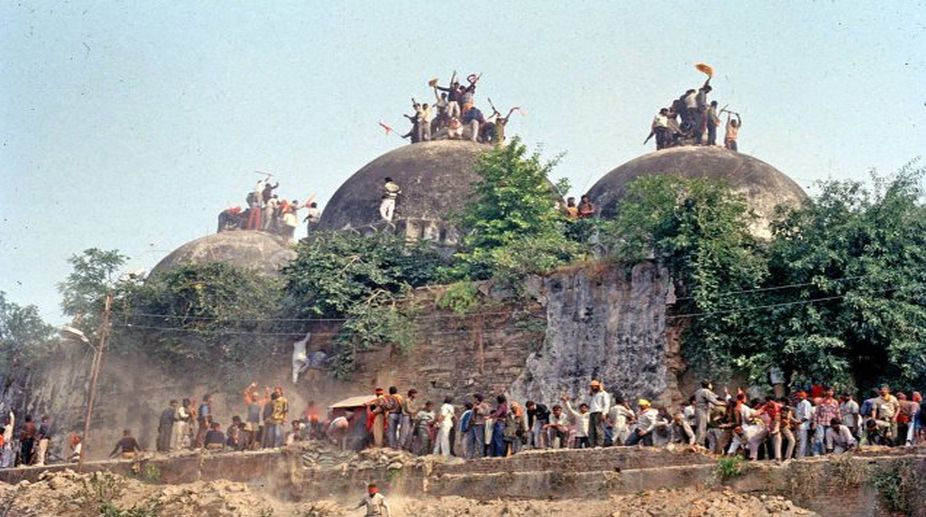BJP MLA urges CM to carve out Siliguri as new district
Bharatiya Janata Party (BJP) MLA from Matigara-Naxalbari, Anandamay Barman, has urged chief minister Mamata Banerjee to create a separate Siliguri administrative district.

Ram Janambhoomi Ayodhya
A sense of scepticism is looming over the out-of-court-settlement between the parties on the Ram Janambhoomi-Babri Masjid issue as suggested by the Hon’ble Chief Justice of India. The idea is noble but scepticism finds its ground to the pre-condition suggested by Subramanian Swamy that the Ram Temple should be built at Ram ‘Janmabhoomi’ while the ‘Masjid’ should be on the other side of Sarayu river. A bargain before mediation promises its failure making a way for BJP to pass legislation in Parliament for the construction of Ram temple in Ayodhya, which in fact is easier.
The Ram Janambhoomi-Babri Masjid issue is so trivial that even the Presidential reference seeking the Supreme Court’s opinion under Article 143(1) of the Constitution on whether a Hindu temple or any Hindu religious structure existed prior to the construction of the Babri Masjid was returned unanswered by a five-judge Bench. Several moves in the past to settle the issue through negotiation including one attempt by the Shankaracharya and religious leaders from Muslim community resulted in failure. Muslim organisations, including the Babri Masjid Action Committee are sceptical about the out-of-court settlement because of past experience.
Advertisement
The Ayodhya dispute is mixed with mythology and history. Faith contradicts facts. The issue remained unsolved even after a quarter century after 1992 and when in all elections the Ram temple issue provided oxygen. Religion still works magic in Indian elections and the promise of a Ram temple polarised votes to the aid of BJP to great extent.
Advertisement
Muslims offered namaz in the Babri Masjid till December 1949 when one night idols were clandestinely installed inside the mosque prompting the lodgment of an FIR. A declaratory suit seeking entitlement to visit and worship was filed. As a temporary measure the Civil Court, Faizabad, ordered refraining from removing the idols and interfering with the puja etc. although the rights were in dispute. Thereafter the Nirmohi Akhara filed a suit in 1959 followed by Muslims filling a case in 1961 praying for a declaration regarding the land.
Another suit came to be filed in 1989 by Vishva Hindu Parishad (VHP). Eventually Allahabad High Court ordered that all the suits regarding the dispute be transferred to the High Court. During the pendency of the cases the country witnessed Babri Masjid demolition at the hands of kar sevaks in 1992. After 18 years, the Allahabad High Court (by a 2:1 majority) and without passing judgment on the title of the disputed land partitioned the property into three parts; one-third to Sunni Waqf Board, one-third to Nirmohi Akhara and one-third to Ram Lalla. This resulted in a more complicated legal tussle in which the Supreme Court intervened in 2011. The matter is pending before the Supreme Court wherein the Chief Justice of India proposed to explore an idea of out-ofcourt-settlement through mediation between the parties.
BJP’s spectacular victory in the state of UP and with Yogi Adityanath as the new CM, possibility of construction of the Ram temple at Ayodhya is seemingly high. Yogi Adityanath himself a vocal proponent of the Ram temple belongs to the Gorakhnath Mutt, which has been associated with the Ram temple movement since 1949. This makes the balance tilt towards the one disputing party. The mediation might see a blank as the Ayodhya dispute is not merely a land dispute; it has parallel criminal proceedings in which many prominent BJP leaders are facing charges. The dispute which saw the demolition of the Babri Masjid highlights a problem deeply rooted in religious faith of two communities in the country. Out-of-court-settlement on the title of the disputed land between the two warring religious groups would not per se allow the government to withdraw itself from prosecuting the criminal cases against the prominent BJP leaders, matters which are at an advanced stage of hearing. This may not be a palatable position for the BJP.
Supreme Court’s suggestion has rekindled a debate on Ayodhya dispute. Different interested groups have welcomed the decision of CJI. An exception is the Babri Masjid Action Committee which though it welcomed the move, also expressed its scepticism on the settlement. Given its past history, private negotiation is unlikely to yield results in this sensitive and sentimental matter. Mediation, even if it prompts a solution cannot negate the eruption of fanatism on either side in future. Further, when BJP is at a much advantageous position of passing legislation in the Parliament to erect a Ram temple, mediation seems to be a weak tool to bring peace. Most welcome therefore would be a judicial pronouncement that would not only seal the dispute but also preserve the secular fabric.
The writer is an Advocate-on Record, Supreme Court of India and Life Member, Indian Society of International Law.
Advertisement